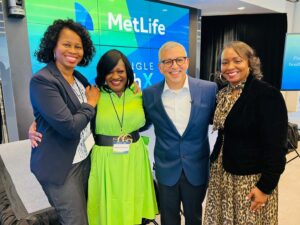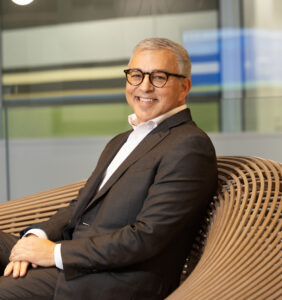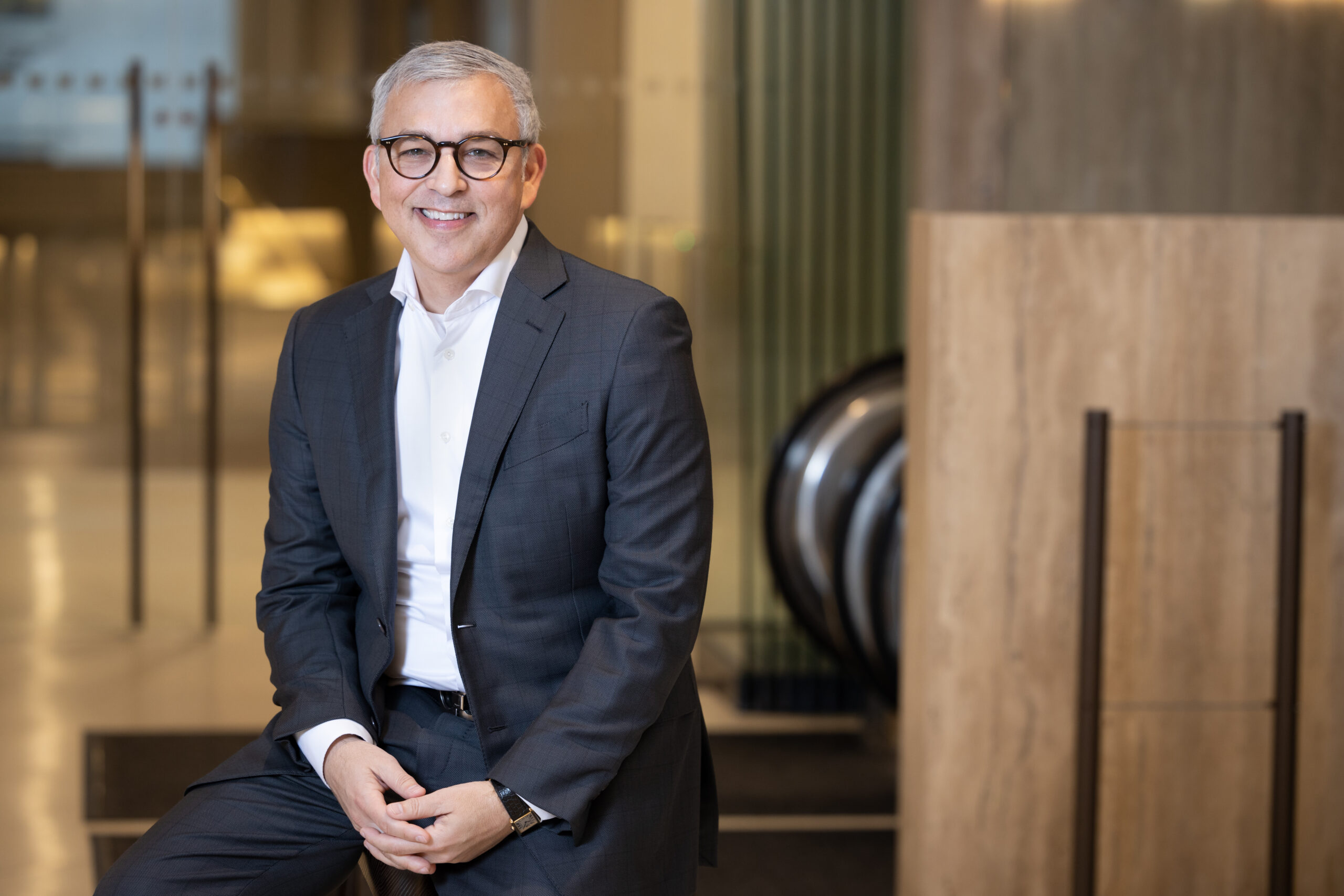Seated behind the desk of his Manhattan office, Bill Pappas gently adjusts his eye-glass frames during a brief moment of quiet self-reflection before carefully choosing how to contextualize the past 36 months of his professional life.
“Crisis management, when done well, can be very addictive,” says Mr. Pappas, Head of Global Technology and Operations at MetLife—one of the largest global providers of insurance, annuities, and employee benefit programs, with more than 90 million customers in over 40 markets.
This is not abstract hyperbole; Mr. Pappas innately understands the hallmarks of effective crisis leadership, having joined the New York-based firm just a couple of months prior to the onset of the global COVID-19 pandemic.
“I was brand new into my role when we made a decision to transition 98% of MetLife’s employees, to work fully-virtually in just a matter of days,” says Mr. Pappas. In doing so, he and his team had the monumental task of ensuring tens of thousands of employees could continue to offer the highest levels of customer service just as the proverbial sky was falling all around them.
“I’m proud to say that, from a MetLife perspective, we remained constant for our customers,” Mr. Pappas continues, noting that despite the massive disruption fueled by the pandemic, the company actually exceeded its previous customer and associate satisfaction scores during this time period.
Now, three years after “crossing the Rubicon,” Mr. Pappas is shepherding another seemingly impossible journey: a return to normalcy. Behind him stand tens-of-thousands of employees and contractors who are responsible for technology development, infrastructure, information and cyber security, data strategy, customer service and much more. For Mr. Pappas, who is responsible for leading each of these verticals, normalcy seems like an abstruse concept.
“What does normalcy really mean?” Mr. Pappas asks rhetorically, “Because there is no going back to a pre-pandemic state—and there is no playbook for charting a path forward.”
Fortunately for Mr. Pappas, his internal compass always seems to point true north.
“It is my belief that when an organization like MetLife must pivot and adjust, we should also adjust our decision-making processes, management routines, communication styles and frequency with both front-line employees and senior leaders,” says Mr. Pappas, referring to the internal sea change transpiring not just at MetLife, but also within thousands of other large enterprises around the world who are trying to read the tea leaves.
Yet, for Mr. Pappas, the way forward does not necessarily require throwing the baby out with the bathwater, since many of the lessons learned over the course of the pandemic are eerily adaptable within our new normal.
“During a crisis, you must align on the singular goal you seek to achieve, and then streamline your decision-making process to act quickly and effectively in order to bring agility and innovation to your business,” says Mr. Pappas, who believes such a formula can be adapted to maintain relevance with customers and achieve a competitive edge within the marketplace.
“To deescalate away from crisis mode toward a more stable environment, we should start by determining what should stay fixed to our radar screens,” he says. “Then, like anything else in life, we can determine when and where to adjust our attention.”
Learning to Lead
When Mr. Pappas joined MetLife in 2019, his adeptness at crisis leadership was but one of the many arrows in his quiver.
Prior to joining the insurance giant, Mr. Pappas served as the head of operations for the consumer, small business, wealth management, and private banking businesses at Bank of America. In his role, Mr. Pappas directed a team of more than 50,000 employees to deliver integrated services and operations solutions to approximately 63 million consumers and clients. He also served as Chief Information Officer for Global Wholesale Banking Technology and Operations at Bank of America as well as head of Capital Markets Middle Office and Operations.

At the Triangle Tech X Conference—which focuses on developing solutions to increase the number of women in STEM—Mr. Pappas and team hosted over 3,500 attendees at the company’s Global Technology Hub in Cary, North Carolina.
Seen as a hands-on leader with a penchant for consistently putting the customer first, Mr. Pappas was named one of Bank Systems & Technology’s “Elite 8” for being a chief information officer who embraced change and innovation to achieve a competitive distinction.
Yet, when asked to expand on his early career success, Mr. Pappas is quick to give credit to the leaders who inspired and shaped his leadership philosophy.
“When I look back, I was extremely fortunate to work for three of the most powerful women in banking: Barbara Desoer, former-CEO of Citibank, N.A.; Cathy Bessant, Vice Chair at Bank of America; and Margaret Keane, former-CEO and current executive chair of Synchrony Financial,” cites Mr. Pappas, who exemplifies the leadership qualities he absorbed from his tenure with this distinguished group.
“The first lesson I learned was how to lead with confidence amid disruption, which was taught to me by Cathy Bessant during the financial crisis of 2008,” Mr. Pappas recalls. “She said to me, ‘I trust you. I trust you. You will figure it out.’ And that was the most powerful thing I could hear—not because somebody was solving a problem for me, but because our people and our leaders trusted that we would do the right thing so long as we cared about our customers and associates.”
As Mr. Pappas notes, trust and empathy are critical for leading during a crisis, especially when there lacks a precedent.
“Much like the COVID-19 pandemic, the financial crisis did not come with a playbook for when to adapt or pivot. But, I always say that the risk of trying is failing—yet simply doing nothing is by far a greater, more malignant risk.” –Bill Pappas, Head of Global Technology and Operations at MetLife
As a former member of The Federal Reserve Bank of New York’s Payments Risk Committee, Mr. Pappas keenly understands the nature of risk, as well as how to mitigate its impact, especially during times of upheaval.
“When other leaders ask how they can prepare an organization to adapt and pivot, I often tell them to learn how to receive bad news well,” Mr. Pappas says, in reference to many difficult, internal discussions regarding how to improve processes and capabilities during a period of extreme market compression, the likes many had never experienced early in the pandemic.
“In order to learn from bad news and mistakes—as well as guide others through uncertain times—we must cultivate an environment built on radical trust and empathy in order to instill the confidence leaders need to execute with excellence when the deck seems stacked against them.”
Fortunately, Mr. Pappas had perhaps the best mentor for inspiring confidence that a leader could hope for in the late Jack Welch; legendary former Chairman and CEO of General Electric.
“Jack once told me that my job was ‘always to be a manager of human resources’, which is a simple phrase that I’ve reflected on time and again throughout my career,” recalls Mr. Pappas.

“You must have passion for people,” says Mr. Pappas, whose eyes light up when he begins extolling the virtues of catalyzing talent. “If you have the right people—from the front line to executive leadership—everything else will come to fruition.”
Under Welch’s tutelage, Mr. Pappas cemented his view that an organization’s associates are their greatest assets, and leaders must ensure that they understand them.
For Mr. Pappas, Welch’s guidance underscored the need to develop human resource skills as a core competency within his own leadership répertoire, in order to attract, retain, and develop a deep leadership bench within an organization—something not always synonymous with the financial and technology sectors.
“I grew up in finance, technology, and operations, but I knew I needed to learn how to create a culture where people would be able to succeed, regardless of their function or role,” says Mr. Pappas, who notes that, “inclusiveness is key so that everyone can achieve their respective career aspirations.”
“I will never forget Jack’s statement,” he says. “Today, I believe I have a people-first mentality: you need the right people first and then solutions will come.”
Unleashing the Magic of MetLife’s Talent
For Mr. Pappas, the spark lit by Jack Welch’s mentorship evolved into a unique perspective on how to unleash the magic of talent with an organization, which he attributes to powerful alignment around a shared purpose.
In fact, Mr. Pappas said what drew him to MetLife was the vision of the company’s CEO, Michel A. Khalaf. “At MetLife, we are a purpose-driven company, and our purpose is to put our customers at the center of everything that we do. This kind of focus is what defines Michel, and as a result, defines MetLife. He looks beyond industry boundaries, he’s authentic and emotionally connected, principled with an unparalleled sense of commitment to our customers and employees. No matter where you sit in MetLife, in what organization or at what level, Michel’s passion around the customer aligns us all to a common goal.”
As Mr. Pappas says, your employees must be brand advocates to serve customers the way they deserve to be served. Furthermore, he says unleashing the magic of talent manifests itself in his multifaceted approach of nurturing a culture of innovation, creativity, and growth—as well as providing employees with the right tools, resources, and support to excel—which is foundational to his success as a leader of people who work in vastly different disciplines. Yet, for Mr. Pappas, leadership begets leadership.
“I wake up every day and the first thing that comes into my mind is to connect with the leaders inside our organization who I depend on to shepherd their respective disciplines. No singular person can lead 50,000 people effectively by themselves alone, so as a leader, I must always remain intellectually curious, ask questions, defer judgement, and ensure that I have context from the leaders I count on.”
Also important, says Mr. Pappas, is the ability to find common ground with a colleague, irrespective of their specific role.
“Regardless of where you sit in a particular discipline, our enterprise-wide charter is to understand how our actions impact our customers, which is foundational to our shared success.”
Within MetLife, the idea of coalescing around customer care was central to the formation of “All Together Possible”—a core cultural tenant that posits that people are the most powerful force-multiplier within an organization. According to the company, catalyzing the magic of MetLife’s talent requires:
- Leadership engagement and accountability throughout their global operations, with a commitment to creating equity across our workforce. This entails establishing a set of expectations, setting clear goals and objectives, and communicating them throughout the enterprise, which Mr. Pappas muses is actually, “a way to take layers out of the organization. But you must communicate more authentically than you have ever before.”
- Upskilling each employee’s ability to grow professionally and to build a career that matters regardless of their background or company role. The challenge, says Mr. Pappas, is upskilling at scale, which requires identifying skills gaps, developing training modalities, investing in technology as well as peer-to-peer learning opportunities, and measuring the effectiveness of an employee’s progress to ensure improvements can be made where necessary.
- Unique experiences, perspectives, and voices collectively make the company stronger and more inclusive. Per the company’s 2030 DEI commitments, MetLife is addressing the needs of the underserved and underrepresented through a mix of investments, products and services, supply chain, volunteering and community efforts. Each commitment is anchored to the company’s business strategy and informed by the United Nations Sustainable Development Goals. The financial components of these commitments will total more than $2.5 billion by 2030.
The concept and execution behind ‘All Together Possible’ ensure customers remain at the center, which emboldens everyone within the organization to stay grounded in their shared vision.
“Creating a positive and inclusive workplace culture, investing in employee training and development, providing opportunities for career advancement, and fostering a culture of innovation has been key to unleashing the magic of talent within MetLife,” says Insigniam co-founder, Shideh Sedgh Bina, who views Mr. Pappas as a leader who is equally as invested as his direct reports.
“Bill is a strategic thinker who understands that to win in the marketplace we must differentiate ourselves by delivering an outstanding customer experience, fostering a culture of innovation, and embracing operational excellence,” said Khalaf, who became president and CEO in May 2019.
“In order to ingrain these principles throughout an enterprise, leaders must live by example,” says Mr. Pappas, who says a “do what I say, not as I do” mentality will sabotage a leader’s and an organization’s ability to realize their aspirations.
“To be effective, people must see that you’re just as engaged and willing to always put in the work too, which provides leaders with the needed credibility to develop teams to be hyper-focused on the goal at hand.”
Did You Do Good Today?
When asked what advice he might offer to other executives wrestling with the myriad of challenges in our current businesses landscape, Mr. Pappas doesn’t hesitate in responding:
“I’ve learned that the only person who can define you is you,” says Mr. Pappas, who says he spent a great deal of his 20s and 30s thinking he needed to be someone else, versus creating the person and leader he sought to be.
“For many, the sky is the limit. But first, you need to figure out who you are in order to be able to define who you want to be,” he says.
Mr. Pappas, a self-professed believer in the mantra that “fear is temporary but regret lasts forever” says, “I love change management because I am comfortable operating in an environment with calculated risk,” which has been a common thread throughout the course of his career.
Reflecting back on said career, which is far from over, Mr. Pappas believes his legacy will be defined by the way he treated others and made them feel.
“For me, I will always go back to a quote from Maya Angelou: I’ve learned that people will forget what you said, people will forget what you did, but people will never forget how you made them feel.”
At the end of the day, Mr. Pappas says, “I can talk about all the exciting, transformational work being done day-in and day-out, but I believe far more people will remember how I made them feel during our interactions, and whether or not MetLife made them feel like they belonged to something bigger.”
From his vantage point, Mr. Pappas believes that MetLife’s employees are not just with the firm due to its strong reputation, but instead, because MetLife is a powerful platform to serve customers, colleagues, shareholders, and the communities in which they live.
“I have an 86-year-old mother and when I was a child, she would say, before you go to bed, think about whether or not you did good today,” he says.
“Sometimes, life doesn’t have to be much more complex than that. Doing good doesn’t mean that everyone will always agree about everything, but quite simply, when you go to bed, you know that you did your best and you know that you did good.”
Bill Pappas
EVP and Head of Global Technology & Operations, MetLife
As a corporate officer and a member of MetLife’s executive leadership team, Mr. Pappas directs a team of more than 43,000 people responsible for technology development, infrastructure, information and cyber security, data strategy and analytics, customer service, operations, crisis management, and business continuity for all lines of business across 40+ countries around the world. Mr. Pappas joined MetLife in 2019 from Bank of America, where he was the head of operations for the consumer, small business, wealth management, and private banking businesses. In this role, he directed a team comprised of more than 50,000 employees and contractors delivering integrated service and operations solutions to approximately 63 million consumers and clients. Mr. Pappas is on the Business North Carolina Power List, highlighting the state’s most influential business leaders, and was named the NC TECH CIO of the Year He is a past member of The Federal Reserve Bank of New York’s Payments Risk Committee and the Harvard Kennedy School’s Council on the Responsible Use of Artificial Intelligence.
Mr. Pappas holds a B.A. cum laude in government and an MBA in international business from Bentley University where he serves on its Board of Trustees.






